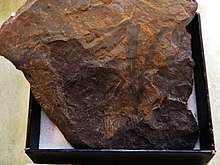Pseudobornia
Appearance
(Redirected fromPseudoborniaceae)
| Pseudobornia Temporal range:
| |
|---|---|

| |
| Pseudobornia ursina | |
| Scientific classification | |
| Kingdom: | Plantae |
| Clade: | Tracheophytes |
| Division: | Polypodiophyta |
| Class: | Polypodiopsida |
| Subclass: | Equisetidae |
| Order: | †Pseudoborniales |
| Genus: | †Pseudobornia Nathorst. |
| Species: | †P. ursina
|
| Binomial name | |
| †Pseudobornia ursina | |
Pseudoborniais agenusofplantsknown only from fossils found from the UpperDevonian.[1]It contains a single speciesPseudobornia ursina,and is the earliest fossil assigned with certainty to theEquisetopsida.
The first fossils ofPseudoborniawere collected byJohan Gunnar AnderssononBear Islandin the 1890s.[2]Hans-Joachim Schweitzer,a paleobotanist, was the first to interpret the fossils as belonging to a largetree,based on additional fossils discovered inAlaskain the 1960s.[3][4]
The probable relationships withinEquisetidaeare shown in the cladogram below. The position whereIbykawould be has been added.[5]
References
[edit]- ^abTaylor, Thomas N.; Edith L. Taylor. (1993).The Biology and Evolution of Fossil Plants.Englewood Cliffs, NJ: Prentice Hall. pp. 305–307.ISBN0-13-651589-4.
- ^"Paleontology: World's First Tall Tree".Time.June 16, 1967.
- ^Schweitzer, H.-J. (1967). "Die Oberdevon-Flora der Bäreninsel I.Pseudobornia ursinaNathorst ".Palaeontographica.120B:116–137.
- ^Schweitzer, H.-J. (1967). "Ein Riesenschachtelhalm aus dem Oberdevon,Pseudobornia ursina".Umschau in Wissenschaft und Technik.6:196.
- ^"Introduction to the Sphenophyta".University of California Museum of Paleontology.Retrieved31 July2011.
